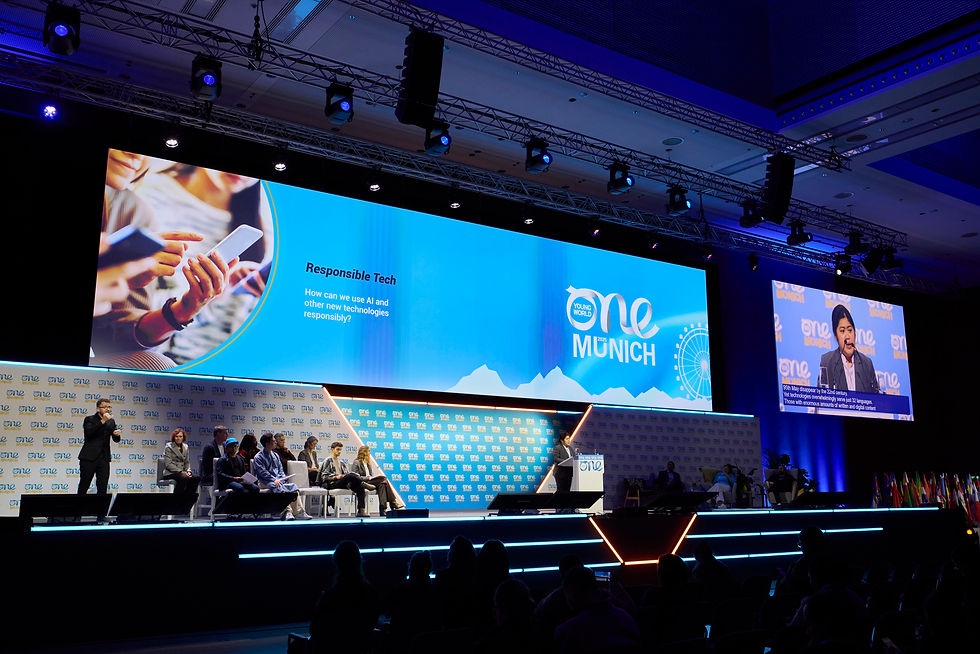Championing Every Language
International Congress Center Messe München

Mayad nga udto! Good afternoon! I am Anna Mae Yu Lamentillo, a Filipino from the Karay-a ethnolinguistic group in Western Visayas.
As a child, I was taught in English, but the language did not come easily.
I wrestled with a speech defect: words with the letter “s” made me stumble.
I was mocked; playmates mimicked my accent and stutter. To them, I was a small, round, stuttering nerd.
I became insecure, but I kept going to school.
I learned to measure progress not in perfect consonants, but in courage: one breath, one word, one more try. On nights when my tongue felt locked, my mother would whisper proverbs in Kinaray-a, and my mouth would loosen to the sounds – familiar, ours.
After decades of practice and stubborn repetition, my mouth finally caught up with my mind. The day I addressed a room in English without stuttering; I felt a door swing wide to my future.
My struggle taught me; words are not equal. Language is not fair. And I made promised to address that.
Over 40% of the world’s 7,100 languages are endangered, and without intervention, 95% may disappear by the twenty-second century.
Yet technologies overwhelmingly serve just 32 languages – those with huge amounts of written and digital content, making them easy to use in apps like Google Translate and ChatGPT.
I’ve seen this firsthand. In the Philippines, 59 out of 175 languages are endangered, two have already gone silent and the majority are not in AI systems.
When I tried speaking Kinaray‑a to ChatGPT, it did not respond.
How can we call technology that only understands less than one percent of the world’s languages fair and responsible?
In 2023, I founded NightOwl AI to safeguard linguistic heritage and ensure every language is digitally represented.
NightOwl AI preserves endangered, low-resource languages with complex morphology.
Our AI-powered platform delivers real-time translation, documents oral speech, transcribes, and digitises archived texts.
We close the digital divide in marginalized communities - enabling elders to teach, children to learn, and communities access to their own words every day, online or offline, with pride and consent.
After a successful pilot supporting Tagalog, Cebuano and Ilokano in the Philippines, we’re now scaling across Asia, Africa, and Latin America—and ultimately wherever linguistic diversity faces extinction.
We will leave no community or language behind.
In two years, we have translated more than two million words across 22 languages.
What began in the Philippines now spans a volunteer network in twenty countries - from Colombia to Nigeria to the United Kingdom.
We have preserved oral stories and texts in languages including Tagalog, Karay-a, Urdu, and Bisaya. We have digitised archives from the 1930s. And we have partnered with media organisations to pilot AI that delivers news in four regional Philippine languages.
We work with communities to co-create open dictionaries and an international team on a framework that puts language inclusion at the heart of AI.
And NightOwl AI is now recognised by groups like She Shapes AI, is part of the Worldwide Alliance for AI and Democracy, and is a UN-recognised civil society partner.
If I told my stuttering three-year-old self that she would be a Delegate Speaker at One Young World today, she wouldn’t’believe me. It’s hard to be a young, indigenous, woman of color and insist on being heard.
For AI and technology to be used responsibly, they first need to be more inclusive. This starts with local-language integration then extends to affordable internet, devices, and local data. We can debate AI’s power and risks, but access is a pre-requisite for responsible use.
The contents of this speech are released under a Creative Commons Attribution (CC BY 4.0) license. Feel free to reuse or distribute with attribution.

